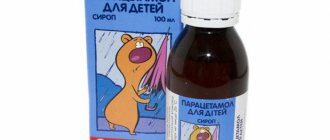Pharmacological properties of the drug Bismuth subcitrate
Antiulcer agent. In the acidic environment of gastric juice, insoluble bismuth oxychloride and citrate are precipitated, forming highly adhesive, persistent, insoluble chelate complexes with proteins on the surface of ulcers and erosions, which form a protective film on the surface of the mucosal defect. The layer of bismuth-protein complex prevents the destructive effects of hydrochloric acid and pepsin and promotes the healing of erosions or ulcers. Does not change the acidity of gastric contents and does not cause hypergastrinemia. It has a cytoprotective effect due to the ability to increase the secretion of bicarbonate ions and the synthesis of prostaglandin E2, which stimulates the formation of mucus. In addition, it has a bactericidal effect against Helicobacter pylori , a microorganism that contributes to the development of chronic gastritis type B and peptic ulcers. Practically not absorbed in the digestive tract. It is excreted mainly in feces. A small amount of bismuth ions that enter the systemic circulation from the digestive tract is excreted from the body in the urine.
The effect of bismuth preparations on the intestines
Today, the most widely used is colloidal bismuth subcitrate, or bismuth tripotassium dicitrate. Despite the fact that bismuth is a heavy metal, it and its compounds are considered low-toxic. This property is explained mainly by their insolubility in neutral aqueous solutions and biological fluids and extremely low bioavailability. Bismuth is practically not absorbed into the blood and that is why it exhibits its maximum effect in the gastrointestinal tract. The drug is excreted mainly in feces, a small amount enters the blood plasma and is excreted by the kidneys. The most common side effect is darkening of the stool due to the formation of bismuth sulfide. This is not dangerous to the patient's health and does not require discontinuation of the drug. However, the patient should be warned about this effect to avoid discontinuation of therapy on their own.
According to the safety index, it belongs to class III - low-toxic, low-hazard drugs. The pharmacodynamics of the drug is well studied. In the acidic environment of the stomach, insoluble bismuth oxychloride and citrate precipitate, forming chelate compounds with the protein substrate in the form of a protective film on the surface of ulcers and erosions (ulcers, erosive gastritis, trophic disorders). Stimulates the synthesis of prostaglandin E (protection factor). Participates in the “accumulation” and “deposition” of epidermal growth factor in the damaged area, stimulating the regeneration of the mucosa.
Side effects when using recommended doses of the drug occur extremely rarely and are temporary. This is the appearance of nausea, more frequent bowel movements or constipation. Based on the available clinical data, no cases of intestinal obstruction have been identified while taking bismuth. The drug can cause more serious side effects only when taken for a long time in large doses, which has no justification for its prescription. Under such conditions, symptoms of “bismuth” encephalopathy may appear (especially in patients with impaired renal function). Based on an analysis of 945 clinical cases, it was proven that side effects occur only when very high doses of drugs are used for a long time.
The safety of bismuth in Helicobacter pylori eradication regimens was confirmed in a systematic review of 35 randomized clinical trials involving a total of 4,763 patients, 2,435 of whom were treated with bismuth salts: no serious side effects were reported. There was also no statistically significant difference in the overall number of adverse events between those patients who took bismuth and those who used non-bismuth regimens. No isolated adverse effects such as abdominal pain, diarrhea, dizziness, headache, metallic taste, nausea or vomiting were observed in the groups. At the end of treatment, patients noted good tolerability and a significant positive effect of the study drug on the clinical manifestations of the disease.
Thus, bismuth preparations do not have a significant adverse effect on the intestines. Moreover, there are research results on the positive effect of bismuth on the course and prognosis of certain intestinal diseases. Its mechanism of action is the binding of a derivative of sulfate-reducing bacteria to hydrogen sulfide in the intestine, the growth of which occurs in inflammatory bowel diseases. Bismuth, combining with hydrogen sulfide, forms insoluble, harmless bismuth sulfide and has a bacteriostatic effect.
One Cochrane review of primary studies described an attempt to use bismuth in the treatment of patients with an established diagnosis of lymphocytic colitis. According to the study results, its advantage over placebo was not established, which may be due to the small sample size of patients. However, no side effects on the intestines or gastrointestinal tract as a whole were observed.
Another study involved the use of bismuth in the treatment of collagenous colitis, which often causes chronic diarrhea. According to the results of the study, resolution of diarrhea was detected in one hundred percent of cases within eight weeks of using the drug. There were also no side effects found in the patient group.
In some cases, with severe ulcerative colitis resistant to drug therapy, restorative proctocolectomy with anal anastomosis of the ileum is used. One of the complications of this intervention is the occurrence of pouchitis - inflammation of the surgically formed reservoir. In one randomized, placebo-controlled trial of 40 patients with chronic pauchitis, bismuth enema treatment significantly improved the condition in 45% of cases compared with the placebo group.
Bismuth preparations, especially bismuth subsalicylate, are used in the prevention and treatment of diarrhea in travelers. A number of studies have confirmed the effectiveness of bismuth subsalicylate in the prevention and treatment of traveler's diarrhea (E. coli enterotoxigenic). Enterotoxigenic E. coli was detected less frequently in travelers who received bismuth subsalicylate than in those who received placebo; this proves that bismuth subsalicylate prevents diarrhea by reducing the amount of enterotoxigenic E. Coli and inhibiting its reproduction.
In addition, there are a number of studies demonstrating the role of bismuth in the treatment of diarrhea-predominant irritable bowel syndrome. In several studies, the use of the drug had a positive effect on the clinical picture of this disease - abdominal pain syndrome, bloating and rumbling in the abdomen significantly decreased, the frequency and nature of stool normalized, and the quality of life in terms of general health, social and psychological functioning of patients improved. One such study compared a combination of bismuth drugs with mebeverine and a placebo with mebeverine. As a result, the bismuth group showed a beneficial effect on symptom regression compared to placebo.
Thus, bismuth preparations are an important link in the treatment of many inflammatory diseases of the esophagus, stomach and duodenum. There are no significant side effects with adequately selected doses when using the drug. Studies that have shown the beneficial effects of bismuth on colon diseases require further study.
Literature
- Chande N, Al Yatama N, Bhanji T, Nguyen TM, McDonald JWD, Mac Donald JK. Interventions for treating lymphocytic colitis (Review) Cochrane Systematic Review – Intervention Version published: 13 July 2021.
- Tahir S Kafil, Tran M Nguyen, Petrease H Patton, John K MacDonald, Nilesh Chande, John WD Mc Donald. Interventions for treating collagenous colitis. Cochrane Systematic Review – Intervention Version published: 11 November 2021.
- Ford AC, Malfertheiner P, Giguere M, Santana J, Khan M, Moayyedi P. Adverse events with bismuth salts for Helicobacter pylori eradication: systematic review and meta-analysis. World J Gastroenterol. 2008;14:7361–7370.
- Moskalev A.V., Gladkikh V.S., Ogienko A.G., Adamova T.P., Gladkikh O.L. Chemical and pharmacological study of drugs based on bismuth tripotassium dicitrate // Effective pharmacotherapy. Gastroenterology. 2021. No. 2 (34). pp. 34–47.
- Minushkin O. N., Topchiy T. B., Chebotareva A. M. The use of bismuth preparations in the treatment of gastroenterological patients and eradication schemes taking into account the recommendations of Maastricht V // Medical Council. 2021. No. 15 (34). pp. 18–19.
- Barton LL, Lyle DA, Ritz NL, Granat AS, Khurshid AN, Kherbik N, Hider R, Lin HC. Bismuth(III) deferiprone effectively inhibits the growth of Desulfovibrio desulfuricans ATCC 27774. Biometals 2016 Apr;29(2):311-9.
- Segal JP, Ding NS, Worley G, Mclaughlin S, Preston S, Faiz OD, Clark SK, Hart AL. Systematic review with meta-analysis: the management of chronic refractory pouchitis with an evidence-based treatment algorithm Aliment Pharmacol Ther. 2017 Mar;45(5):581–592.
- Daghaghzadeh H, Memar A, Mohamadi Y, Rezakhani N, Safazadeh P, Aghaha S, Adibi P. Therapeutic Effects of Low-dose Bismuth Subcitrate on Symptoms and Health-related Quality of Life in Adult Patients with Irritable Bowel Syndrome: A Clinical Trial J Res Pharm Pract. Jan-Mar 2018;7(1):13–21.
Use of the drug Bismuth subcitrate
120 mg 3 times a day 30 minutes before breakfast, lunch and dinner and 4 times before bed. Take 1-2 sips of water (but not milk). Treatment is carried out for 4–6 weeks. If necessary, the duration of treatment can be increased to 8 weeks, then take a break for 8 weeks, during which it is not recommended to take other products containing bismuth. For Helicobacter pylori infection, it is rational to combine treatment with bismuth subcitrate with oral administration of metronidazole 250 mg 4 times a day and amoxicillin 500 mg 4 times a day for 10 days. In case of intolerance or hypersensitivity to amoxicillin, it is recommended to take tetracycline at a dose of 500 mg 3 times a day. The effectiveness of such therapy aimed at eradicating Helicobacter pylori reaches 95%.
Bismuth tripotassium dicitrate
BISMUTH TRIPOTASSIUM DICITRATE Bismuth tripotassium citrate
,
,
Compound
1 tablet contains the active substance: bismuth tripotassium citrate - 304.6 mg, in terms of bismuth oxide - 120.0 mg.
Pharmacotherapeutic group
Antiulcer, antiseptic, intestinal and astringent
ATX code
А02ВХ05
pharmachologic effect
Gastroprotective and antiulcer agent with bactericidal activity against Helicobacter pylori. It also has anti-inflammatory and astringent effects. In the acidic environment of the stomach, insoluble bismuth oxychloride and citrate are precipitated, and chelate compounds are formed with the protein substrate in the form of a protective film on the surface of ulcers and erosions. Thus, the drug forms a protective layer, which for a long period of time protects the affected areas of the mucous membrane from the influence of aggressive factors. By increasing the synthesis of prostaglandin E, mucus formation and bicarbonate secretion, it stimulates the activity of cytoprotective mechanisms, increases the resistance of the gastrointestinal mucosa to the effects of pepsin, hydrochloric acid, enzymes and bile salts. Leads to the accumulation of epidermal growth factor in the defect area. Reduces the activity of pepsin and pepsipogen.
Indications for use
• functional dyspepsia not associated with organic diseases of the gastrointestinal tract, • chronic gastritis and gastroduodenitis in the acute phase, including those associated with Helicobacter pylori, • peptic ulcer of the stomach and duodenum in the acute phase, including those associated with Helicobacter pylori, • syndrome irritable bowel disease, occurring predominantly with symptoms of diarrhea.
Contraindications
• increased individual sensitivity to the components of the drug, • pregnancy, • breastfeeding, • taking medications containing bismuth, • chronic renal failure, • children under 4 years of age.
Method of administration and dosage
Inside. The duration of the course of treatment and the dose of the drug are determined by the attending physician individually for each patient, depending on the nature of the disease. For adults and children over 12 years of age, the drug is prescribed 1 tablet 4 times a day, 30 minutes before meals (breakfast, lunch, dinner) and at night, or 2 tablets 2 times a day 30 minutes before meals (breakfast, dinner). Children aged 8 to 12 years are prescribed 1 tablet 2 times a day, 30 minutes before meals (breakfast, dinner). Children aged 4 to 8 years are prescribed at a dose of 8 mg/kg/day, depending on the child’s body weight, 1-2 tablets per day are prescribed (respectively, in 1-2 doses per day). In this case, the daily dose should be as close as possible to the calculated dose (8 mg/kg/day). The tablets are taken 30 minutes before meals with a small amount of water. It is recommended to swallow the tablet whole, without chewing or crushing, with a sufficient amount of water. It is not recommended to take the tablets with milk. The duration of treatment is usually from 4 to 8 weeks. After finishing taking the drug, it is not recommended to take medications containing bismuth (for example, Vikalin, Vikair) for 2 months. For eradication of Helicobacter pylori, it is advisable to use bismuth tripotassium citrate in combination with antibacterial drugs with anti-Helicobacter activity.
Release form
Film-coated tablets 120 mg. 7, 10, 14, 28, 30 tablets in blister packs made of polyvinyl chloride film and printed varnished aluminum foil. 7, 10, 14, 20, 28, 30, 50, 56, 60, 100, 112, 160 or 240 tablets in polyethylene terephthalate jars for medicines or polypropylene for medicines, sealed with high-density polyethylene lids with first opening control or polypropylene lids with a “push-turn” system or low-density polyethylene lids with first-opening control.
Terms of release from pharmacies
Available without a prescription.
Special instructions for the use of the drug Bismuth subcitrate
Long-term use of bismuth subcitrate in high doses is not recommended due to the possible development of reversible encephalopathy. It was revealed that at the end of treatment, the concentration of the active substance in the blood plasma is about 5 μg/l, and a negative effect is observed only at a concentration of 100 μg/l. During treatment you should refrain from drinking alcohol. Bismuth sulfide formed as a result of taking bismuth subcitrate can turn stool black. 30 minutes before and after taking bismuth subcitrate, you must refrain from drinking drinks, solid food, milk, and taking antacids.
Overdose of Bismuth subcitrate, symptoms and treatment
With frequent use of high doses, reversible renal failure may develop, the symptoms of which may appear after 10 days or later. If signs of bismuth subcitrate poisoning appear, it is necessary to rinse the stomach, prescribe activated charcoal and saline laxatives. Monitoring of kidney function and bismuth concentrations in the blood and urine is indicated. Symptomatic treatment is carried out. In case of impaired renal function, accompanied by a high level of bismuth in the blood plasma, complexing agents - dimercaptosuccinic and dimercaptopropanesulfonic acids - can be administered. In severe renal failure, hemodialysis is indicated.
List of pharmacies where you can buy Bismuth subcitrate:
- Moscow
- Saint Petersburg
De-Bismuth caps. 120 mg in a container pack. №10x6
Name
De-bismuth
Description
Hard gelatin capsules are cylindrical in shape with white hemispherical ends.
Main active ingredient
Bismuth tripotassium dicitrate
Release form
10 capsules in a blister pack made of polyvinyl chloride film and aluminum foil. Three or six blister packs along with instructions for use in a cardboard pack.
Dosage
120 mg
pharmachologic effect
Antiulcer agent with bactericidal activity against Helicobacter pylori. It also has anti-inflammatory and astringent effects. In the acidic environment of the stomach, insoluble bismuth oxychloride and citrate are precipitated, and hepatic compounds are formed with the protein substrate in the form of a protective film on the surface of ulcers and erosions. By increasing the synthesis of prostaglandins E, mucus formation and bicarbonate secretion, it stimulates the activity of cytoprotective mechanisms, increases the resistance of the gastrointestinal mucosa to the effects of pepsin, hydrochloric acid, enzymes and bile salts. Leads to the accumulation of epidermal growth factor in the defect area. Reduces the activity of pepsin and pepsinogen.
Indications for use
- peptic ulcer of the stomach and duodenum. - gastritis, accompanied by complaints of dyspepsia, for which eradication of Helicobacter pylori is recommended.
Directions for use and doses
For adults and children over 12 years of age, the drug is prescribed 1 capsule 4 times a day 30 minutes before meals and at night, or 2 capsules 2 times a day 30 minutes before meals. Children from 6 to 12 years old are prescribed at a rate of 8 mg/kg/day. Depending on the child’s weight, 1-3 capsules per day are prescribed (respectively, in 1-3 doses per day). In this case, the daily dose should be as close as possible to the calculated dose (8 mg/kg/day). Capsules should be taken 30 minutes before meals and washed down with a small amount of water. The duration of treatment is 4-8 weeks. Over the next 8 weeks, you should not use medications containing bismuth. To eradicate Helicobacter pylori, it is advisable to use De-Bismuth in combination with other antibacterial agents that have anti-Helicobacter activity.
Use during pregnancy and lactation
The use of De-Bismuth during pregnancy and lactation is contraindicated.
Precautionary measures
The drug should not be used for more than 8 weeks, and it is also not recommended to exceed the established daily doses for adults and children during treatment. During treatment with De-Bismuth, you should not use other drugs containing bismuth, as the risk of side effects increases. At the end of a course of treatment with the drug in recommended doses, the concentration of the active substance in the blood plasma does not exceed 3-58 mcg/l, and intoxication is observed only at concentrations above 100 mg/l. When using De-Bismuth, stool may turn dark due to the formation of bismuth sulfide. Sometimes there is a slight darkening of the tongue. Prolonged use of large doses of bismuth-containing compounds is not recommended, since in some cases it can lead to reversible encephalopathy. The risk of encephalopathy, however, is minimal, provided that De-Bismuth is used in recommended doses. Children The drug is not used in children under 6 years of age. Effect on the ability to drive vehicles and operate machinery There is no data on the effect of De-Bismuth on the ability to drive vehicles and operate machinery.
Interaction with other drugs
Within half an hour after taking De-Bismuth, it is not recommended to take other medications internally, as well as take food and liquids, in particular antacids, milk, fruits and fruit juices. This is due to the fact that when taken orally simultaneously, they can affect the effectiveness of De-Bismuth.
Contraindications
- hypersensitivity to any component of the drug - severe renal dysfunction - pregnancy and lactation - children under 6 years of age
Compound
1 capsule contains: active substances: bismuth oxide (in the form of bismuth potassium citrate) – 120.0 mg. excipients: magnesium stearate, colloidal anhydrous silicon dioxide, potato starch. composition of gelatin capsule No. 0: gelatin, purified water, titanium dioxide E-171.
Overdose
Symptoms: Acute massive overdose can lead to renal failure with a delayed onset of up to 10 days. Treatment: After a single dose of a very high dose, treatment should include gastric lavage, followed by activated charcoal and osmotic laxatives. This reduces the absorption of bismuth, so additional therapeutic measures are not required. Bismuth concentrations in the blood and urine should be determined in cases of acute and chronic intoxication to determine whether symptoms are related to increased bismuth exposure. Chelation therapy with dimercaptosuccinic acid (DMSA) or dimercaptopropanesulfonic acid (DMPS) is used if symptoms are known to be caused by acute or chronic bismuth overdose. In severe renal failure, hemodialysis should be performed after chelation therapy.
Side effect
From the digestive system Very common (≥ 1/10): - Blackening of the stool may occur due to the formation of bismuth sulfide, but it can be easily distinguished from melena. Rarely (≥ 1/1000,
Storage conditions
In a place protected from moisture and light at a temperature not exceeding 25 ° C. Keep out of the reach of children! Shelf life: 2 years Do not use after the expiration date indicated on the package.
Buy De-Bismuth caps. 120 mg in a container pack. No. 10x6 in the pharmacy
Price for De-Bismuth caps. 120 mg in a container pack. №10x6
Instructions for use for De-Bismuth caps. 120 mg in a container pack. №10x6



